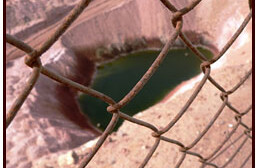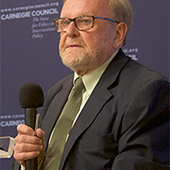In all of the planet's most intractable conflicts there are certain long-standing, grievous causes that divide, seemingly insolubly. In the case of the Middle East, for example, hotly contested obstacles to peace include the status of Jerusalem, the right of return of exiled Palestinian Arabs, and Jewish West Bank settlements.
Yet if there were less emotionally charged discussion items that could bring responsible parties to the negotiating table—items removed from the white heat of settlements, for example—there might be a degree of progress, not only on the matters under discussion, but also in terms of creating a more positive atmosphere for negotiation in general. This in turn could eventually lead to a more positive approach to the most difficult hurdles.
We argue that, in the case of the Middle East—and, for that matter, in other volatile areas such as Central Asia and South Asia—there is an agenda item that lends itself to this strategy, and that is water. Consider the following:
A recent Catholic Relief Services (CRS) report states some facts that are both predictable yet critically important:
"Water is vital for sustaining the life of each person, for sustaining health and socio-economic well-being, and for making possible the very existence of life in our planet. The total amount of water of planet earth is fixed. Of the world's water, only 2.5 percent is freshwater, most of which is locked up in glaciers or deep underground."From the same CRS report:
"Approximately one-third of the world's population lives in water-stressed countries, primarily in Africa and Asia. Absolute water scarcity already affects more than 500 million people in more than 30 countries. By 2025, the proportion of the world's population living in water-stressed countries is set to increase by two-thirds. Accordingly, water-related conflicts are expected to intensify in such areas."These leads to two corollary conclusions: one, dialogue and possible cooperation over water ought to be a pressing concern for states in water-starved regions even as they are riven by other issues; second, instead of seeking cooperative approaches to potable water extraction, this most fundamentally precious resource is all too often used as a tool in the overall context of conflict. Thus:
"The notion of water security is linked to different actors' need to attain control and access to water resources in order to secure their vital interest on various scales and geographic levels, seen from a strategic, political, economic, cultural, environmental and social perspective. The fact that different actors have incompatible, competing or conflicting strategic interests often creates conflicts with varying intensity." --Jon Martin Trondalen, "Climate Changes, Water Security and Possible Remedies for the Middle East," Scientific Paper 2009, the United Nations World Water Assessment ProgrammeIn the case of the Middle East, the water clock is ticking, as it were. Fresh water is a particularly precious and scarce resource, and difficult to obtain in an unforgivingly arid landscape. The region secures adequate fresh water through desalination plants; but these are expensive, and as climate change inevitably aggravates the freshwater supply problem, the burden of cost will become prohibitive. In addition, as Binsal Abdul Kader of Gulf News points out, desalination plants and aquifers hold only a finite amount of freshwater, and the Middle East nations are using water at a much faster rate than they can produce freshwater to refill them.
The ticking clock affects other sensitive, conflict-prone regions of the globe. To cite but one other, Michael Renner of the Norwegian Peacebuilding Center (NOREF) has pointed to the potentially catastrophic mix of climate change consequences, competition over water resources for both drinking supplies and irrigation, and conflict in Central Asia. This is, after all, an extended region where the water question involves Afghanistan, Pakistan, and two Central Asian states, Tajikistan and Kyrgyzstan, all of which have experienced internal conflicts in the post-Cold War period. In addition, Kyrgyzstan has highly charged relations with neighboring Uzbekistan due to the perceived mistreatment of the Uzbek minority in these conflicts.
As Renner puts it:
"The growing concern over climate change in Central Asia is due to the degree to which climate change affects the region's energy, water and food security and how this can lead to political tensions and conflict unless this issue is carefully, and collectively, managed....competing water plans [among various states] pose critical challenges under conditions of environmental degradation, demographic pressure and rising demand for water....Central Asia's water challenges do not necessarily or inevitably lead to armed conflict. Unalleviated, however, they increasingly threaten to undermine human security and to bring different communities and regions into dispute with each other."In sum, all too often the pendulum swings away from conversation over water resource cooperation to confrontation. The types of conflict are legion, and deadly serious. As listed by the Pacific Institute, they include:
- Control of water resources, whether by state or non-state actors, where water supply or access is used to inflame tensions
- Water as a military tool, where water resources or systems are used by a nation or state as a weapon during a military action
- Water as a political tool, where water resources are used by a nation or non-state actor for a political goal
- Terrorism, where water resources or systems are either targets or tools of violence
- Development disputes, where water resources or systems are a source of contention or dispute in the context of competing economic and social development.
- "Drought and inequality in water distribution spark killings and conflict in India" (2009)
- "Terrorists bomb water pipe in India" (2004)"
- "U.S. halts water projects in Gaza" [as retribution for deadly attack on a U.S, diplomatic convoy] (2003)
- "Iraq attempts to poison water at U.S. base" (2003)
- "Insurgents bomb Iraq pipeline" (2003)
- "Palestinians destroy water supply to Israeli settlements" (2001)
- "Central Asian nations cut off water to neighbors" (2000)
- "Afghanistan villages fight over water" (2000)
- "Villagers killed in Yemen water clash" (1999) (From the the Pacific Institute)
The gravity of water issues has hardly gone unrecognized. Over the years the United Nations, for example, to cite the most obvious forum for serious global dialogue, has issued numerous reports on water resource and competition. Yet the deck remains stacked on the conflict/competition side. As the United States and others take on the thorny issues of climate change and its impacts, as well as resolution of conflicts that pockmark the Middle East and other regions of concern, the water issue, and a refocusing on cooperation over water resources, must surely be front and center. To restate our original premise: a constructive engagement over water supply and stewardship might just create an atmosphere conducive to constructive dialogue on more contentious problems in the Middle East and other areas of conflict. And this approach is all the more to be recommended by the fact that the prevailing use of this most fundamentally precious commodity as a pawn in a zero-sum game is simply unsustainable.
In 2011, the Carnegie Council intends to launch a program that will look at the nexus of climate change, resource competition, and violent intergroup conflict.





